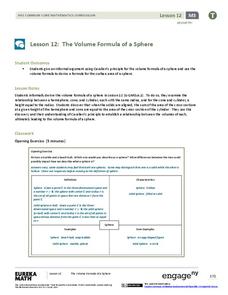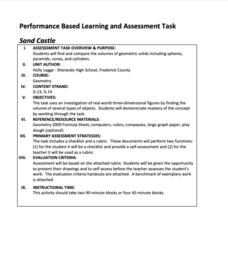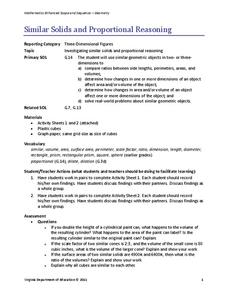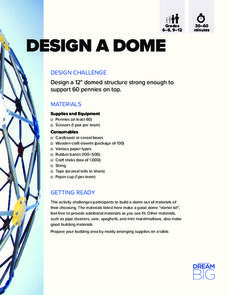Virginia Department of Education
Surface Area and Volume
Partners use materials to wrap three-dimensional objects to determine the formula for surface area. The groups use an orange to calculate the amount of peel it takes to completely cover the fruit. Using manipulatives, individuals then...
EngageNY
The Volume Formula of a Sphere
What is the relationship between a hemisphere, a cone, and a cylinder? Using Cavalieri's Principle, the class determines that the sum of the volume of a hemisphere and a cone with the same radius and height equals the volume of a...
Radford University
Sand Castle
Don't let the task slip through your fingers like sand. Scholars design sand castles using hemispheres, pyramids, cones, and cylinders of different sizes. They calculate the volume and surface area and consider how changing the...
Virginia Department of Education
Similar Solids and Proportional Reasoning
Double the dimensions, quadruple the surface area. Pairs build similar prisms and compare the ratios of their surface areas and volumes to the ratio of the heights. Given two similar cones, partners determine the ratios of the lateral...
Serendip
Diffusion and Cell Size and Shape
Is your class ready to size up the topic of diffusion? Help them get cell shape savvy with a well-written handout. The resource covers how substances such as oxygen passively move through the cell membrane and how cell size and shape...
DiscoverE
Design a Dome
Do domed structures have advantages over their less-than-spherical counterparts? Junior architects explore the pros and cons of domes through a design challenge. Teams work together to plan, sketch, build, and test domes created from an...
Mrs. Burke's Math Page
Let Them Eat Pi
Looking for a fun and creative way to celebrate Pi Day? Then this is the resource for you. From a scavenger hunt and trivia contest to PowerPoint presentations and skills practice worksheets, this collection of materials is a...






